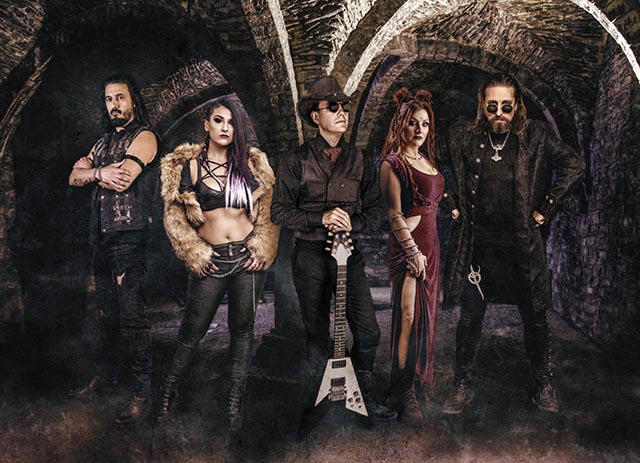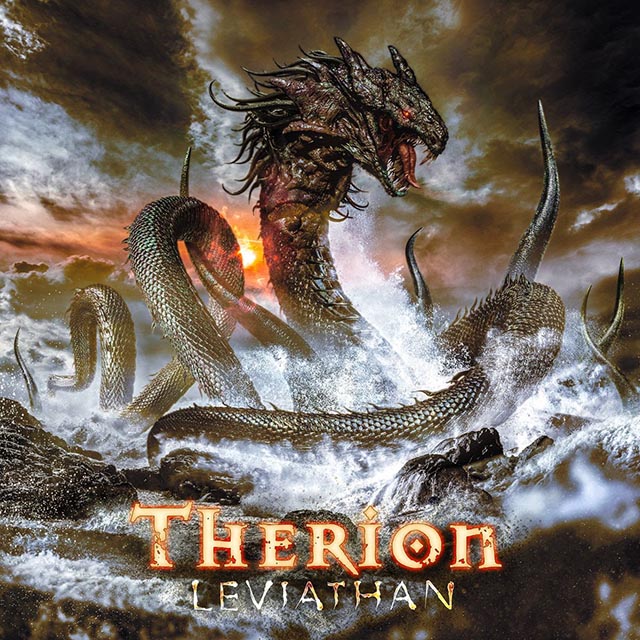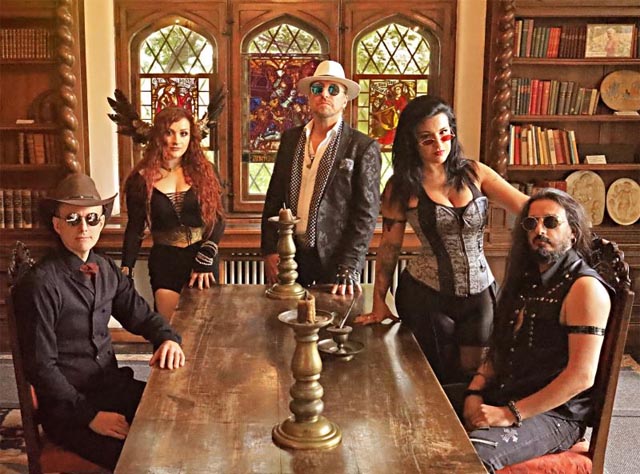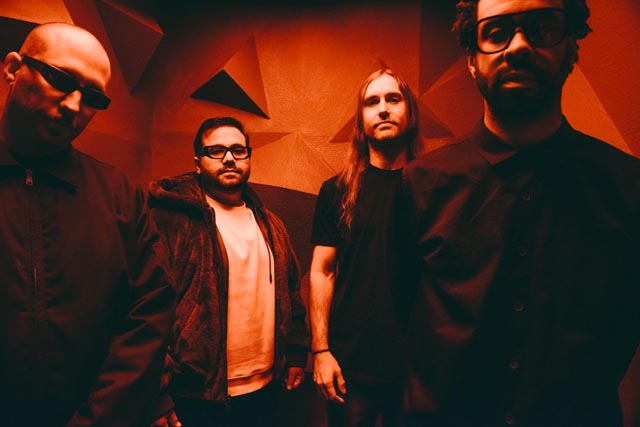
There is a natural brilliance behind Therion mastermind Christofer Johnsson. as he doesn’t seem to stop writing and isn’t afraid of experimenting. We did see a tremendous experiment with the ambitious soundtrack to the rock opera that never had its debut live performance yet due to the COVID-19 pandemic with 2018’s Beloved Antichrist. Now, on their latest effort, Leviathan (released on January 22nd via Nuclear Blast – order here), Johnsson has listened to his fans and decided to create a record specifically for Therion-fanatics. We caught up with the artist to discuss the new record and the overall challenges he faced in the recording process.
The new album, Leviathan, will most likely be one of the highlights of this year. It’s a fantastic record, you’ve definitely delivered a record filled with Therion hits. It’s another ambitious piece, but I wanted to know what your experience was like for you to step away from Beloved Antichrist to put this album together?
We did whatever we wanted and if we were lucky, the people would like it. And if we did something that people liked less than the record sales would go down. So therefore, the Therion record sales have always been a rollercoaster up and down through history. So we figured the only thing we haven’t done ever is trying to please the fans. And obviously the record company will be pleased as well if they can get something that’s easy to sell. So we decided to do that, and it sounds like it’s an easy thing to do. Yeah, we’re very experimental, so we’re above making hit songs. But really, is it that easy to just take your guitar and write a hit song. So let’s test our songwriting abilities and see if we can do it. And in the beginning it was actually very difficult, but after a while, things just completely broke loose. We wrote a stunning, over 40 songs. All these 40 songs were not hit songs, but at least 34, 35 songs were definitely good enough to be on a record. So we actually had enough material for three albums. So Leviathan is actually the first album in the trilogy of Leviathan albums that we’re working on. As we speak, we have already recorded most of the stuff for Leviathan 2, because we decided not to leave the studio. Because we can’t tour anyway because of this corona chaos, we thought, why not continue to record so we don’t lose any time. And I mean, we have the material, so why not?
The plan is that the second album should be recorded before the summer, recorded, mixed, and even parts of the third one should be ready before the summer. So we can release a Leviathan album every year now for three years in a row. And the material has a little bit of a different direction. We noticed a certain portion of the material was very direct, very bombastic. Yeah, typical hit songs. So we decided to make one epic hit album, which is, Leviathan 1, The one we’re promoting right now, and a lot of material was more dark and melancholic, that will be on Leviathan Two. Still a very catchy, hit type of album. And then what was left was a lot of songs that were written spontaneously during this period, some songs that were a little bit more adventurous or experimental. So the third record will be a little bit more odd. We will have some folk music influences, we’ll have some more proggy influences and adventurous songs.
So it was kind of an unexpected thing. And one of the reasons that we were so productive is because me and Thomas Vikström became a very effective songwriting team. Normally I would write most of the songs and the other guys would contribute for a song or two. And normally when I wrote together with somebody, it used to be that somebody wrote a half-finished song or an almost finished song and I would complete it. But now, me and Thomas were exchanging ideas all the time. I would send a lot of unfinished stuff to him and he would add something and so on. And so a lot of cool ideas that normally would never make a complete song, because I come up with maybe two cool guitar riffs, but it doesn’t end up to be a full song. I have tons of that on my computer hard drive. This time I would send everything that sounded cool to Thomas and then maybe he could take it to the next step and send it back to me. And also, on the other hand, a lot of the stuff that he wrote that normally would not fit Therion at all, style-wise, he would send me anything that he wrote that he considered good. And in many cases I could kind of Therionize it. If you have a really good pop song, it can still make a cool metal song out of it. It’s a matter of arrangement. So therefore we became this super production.
You mentioned how you tried different styles on these albums. For example, the opening track, “The Leaf on the Oak of Far,” started off sounding as a classic ’80s metal tune. Can you talk more about the experience writing this song?
Well, this song was specifically written to be an opening track. I mean, we have a lot of ’80s heavy mental influences in our music, if you go through the back catalog. I mean, that’s the music we grew up with. So for me, Judas Priest, INXS, Iron Maiden, that’s what metal guitar sounds like to me. Yeah. It sounds a little bit like Saxon and Manowar decided to do a Therion song together. Something like that. Very bombastic ending. And I don’t know, it kind of follows the formula of “Blood of Kingu,” a little bit, the opening track we had on Sirius B in 2004, also very ’80s heavy metal, up-tempo, another bombastic ending. But I wanted to put something a little bit unpredictable in there. So we’ve put some cute female pop vocals in it. Every Therion album needs to have something that sparks debate, something that some people will be very annoyed with and other people think it’s genius. And I had spontaneous comments about this song from a lot of journalists during the interviews I’ve done now, and some people say, “How did you come up with putting that type of vocals there? It’s brilliant.” And some other guy said, “Well, I really love that song, but why the hell would you put that kind of vocals? It ruins it.” So I guess that’s a typical Therion thing also. It shouldn’t be too easy. There always at least has to be something to poke some people in the eye.
Because there’s so many different layers with this album, were there any particular songs that were more challenging to write?
“Eye of Algol” was a bit of a tricky one. This one we would do a lot of different versions of before we finally got to where we wanted. There’s this stick in the song, which is a little bit like neo-classical Bach influence. Originally, the idea was to make a Beatles-influenced vocal thing for the second verse. And we did that, but it sounded more like a mixture between Queen and Beach Boys than Beatles. So it was just too happy for Therion. So I told Thomas, we need to change something in the vocal harmonies here, it’s too happy. So we would change it, put some Bach into it, and then it sounded great, but it sounded wrong as a second verse. So we just thought then, okay, let’s keep this as a stick, and then we’ll make the second verse the same like the first one is. So this one, we did a lot of changing like that before we found the real formula.
And we also recorded a lot of different types of vocal styles before we found the right one. And we did that with lots of songs. Normally we would record everything in my own studio, which means that the studio time is for free. Since I’m sitting there working with people, you don’t waste a lot of time anyway. Like if I tell somebody to sing in a certain style, we’ll just try it out, and maybe we waste 15, 20 minutes and it’s the wrong direction then it will just say, sorry, let’s scrap that, let’s just strike this battle again. But because of the corona chaos, we had to record everything at a distance. Because they had shut down in the airport in Malta, where I live. So I couldn’t fly myself anywhere else. I couldn’t fly anybody in. So this album was actually in Sweden, Malta, Israel, Argentina, USA, England, Germany, Spain, and Finland.
So I had to trust people, that they would do a good job. I would have to send them demo versions with some instructions and they would have to book a commercial studio, go there, record their interpretation of what they think I wanted, and in many cases, it was brilliant, but in some cases it was completely different from what I wanted. I mean, an idea can sound great in theory, but once you try it out, it may not be as great. We did that also in “Tuonela” a lot. We tried different vocal things. And because we anyway recorded them professionally and they put a lot of effort into nailing those versions, we decided to release some of it on the Producer’s Edition, we call it, a digipak version of the CD where you can hear these alternative vocal versions.
Especially I think with “Tuonela” it can be interesting because when you have a wonderful singer like Lori Lewis in the band and you have a vocal line which would be in theory perfect for her, and we use a different singer instead, people would probably think, what if Lori would have sang this and why didn’t you have Lori singing this, well, the fact is that she did sing it. We recorded it and it sounded brilliant. I mean, who doesn’t like Lori Lewis? It sounds great. But there was still something that was missing in there. I wanted something more innocent, you know? And if you’re a middle-aged woman who has been touring the world, you can’t really get that innocent thing, you know? You’re too self-secure in yourself and too professional and whatever.
So I decided to use a completely unknown singer, a young, unknown singer to get this kind of dreamy thing, something a bit naive and dreaming, somebody who hasn’t made it yet, to put their dreams and their hopes into the vocals. And it sounded brilliant. But because this was a melody originally made for Lori Lewis, I of course want to release both versions. So one would be the bonus version. And also Marko from, I was about to say from Nightwish but now he just left Nightwish, so ex-Nightwish, he was supposed to sing the verse in this song. But for inspiration, I sent him the whole song and gave him the complete feel of the song, and he liked the song so much that he decided to record the whole thing. So he recorded verse, bridge, chorus, everything. And when I listened to it, I realized he sounds much better in the chorus. And then I had already recorded Thomas in the chorus, and it’s like, this sounds better than Thomas. So I have to send Thomas back and re-record the verses instead. So they swapped places. And there you can really hear how different it sounds. It’s not a matter about being a professional singer with a very good voice, it’s also a matter of being the right person in the right place to get it perfect.
Having this go down during a pandemic in different countries, recording and testing, sounds like an intense experience.
Yeah. For good and for bad. I mean, there’s some people that would continue to work like this because they really get it. They understood immediately what I wanted and it’s very convenient, but there were also some things that were not good. I mean, we recorded drums with Snowy Shaw first, and six of the songs on the record, it’s Björn Höglund instead. Actually two of them, when we were recording drums, we recorded two more songs, but there were, let’s see, four songs from the album that was originally recorded by Snowy that we had to re-record because I wasn’t happy with it. It wasn’t steady enough, I could just hear the sound of the recording, editing was not done professionally and so on. So it’s a very expensive way of working, because if I would have been sitting there recording this normally from scratch, I would have heard immediately, no, sorry, this doesn’t work. I know he put a lot of effort into doing it and then I still had to scrap it. So we were shredding an insane amount of money on people trying to nail things as good as they can for something that ended up not being used. And also in commercial studios. I mean, normally we do everything in my studio, so it doesn’t cost anything per hour.
One good thing though, I have to mention about this is that normally when I record everything, I have to listen to all the shit all the time. You know, if you have to listen to drums for 10 days in a row, and then you have to listen to a lot of bass and then you have to listen to guitars for another week or two weeks, and then you have to listen to all the vocal takes and the orchestration and this and that. So when you’re done with the mix, you’re completely tired. Then you’re like, I don’t want to see a studio for another year. But because everybody recorded on their own now, my ears were fresh all the time. And also it saved time because I could have multiple things recorded at the same time. I could have Christian Vidal recording guitar solos in Argentina at the same time as we had the Hammond organ recorded in Sweden and a choir in Israel and the lead vocals in Spain. That’s a really cool thing. And because of that, we could continue to record the next album immediately, because I wasn’t exhausted from this. It felt like this was next to nothing after doing Beloved Antichrist, you know, three albums at the same time, it was really a piece of cake doing this. And especially since I didn’t have to sit there and listen to everything, every take. So that’s a very good aspect actually of working this way that I would like to keep. If it’s not absolutely necessary for me to sit down and listen to everything all the time, then why should I? I put Björn Höglund on drums. I gave him instructions and he just delivered it. If there’s any sort of help, he will FaceTime me from the studio and say, “Hey, do you want it like this or like that?” And I say, “Okay, like that.” “Okay, good.” If there’s something that’s still not good, then he’ll just re-record it. But for 90% of it, he just nailed it, you know? So why would I fly him in and sit and listen to drums for two weeks when he can just do it by himself? So that’s really good.
How was the experience having multiple musical guests for this album?
We have four guest singers, I think. We have Taida. We have Marko. We have Noa Gruman from Scardust. We have, Mats Levén, of course. Yeah. So there are four guest singers. And then we have the people who are permanent members, and we also have Rosalia and Chiara, which are not members of the band, but they are live members, they tour with us. There’s a lot of singers, like every Therion album.
How was it specifically working with Noa from Scardust?
I know her since before, they were our support act when we played in Israel, and she made choral arrangements to have a choir on stage with Therion when we played there. So I knew that she was very professional. And I think her band is really good too. So I really put a lot of trust in her and she delivered very good results. So I’m definitely going to work with them again.
This year marks the 30th anniversary of Of Darkness…, you guys have gone through a lot of changes since. Just for fun, what are some thoughts you have on making that album to Therion’s overall progression?
Well, the first album you do, it’s a very important album I think for any band. It’s the first time you go into a record studio and the first time you deal with a record label. So no matter if it’s a good or a bad experience, you learn some very, very valuable lessons. We recorded that record, we recorded and mixed it in six days. And our budget was, I think something like 500 euros, like $600, which wasn’t enough, so we had to add the same amounts from our own pockets. And yeah, it was kind of a best of album from what the material we had written in the ’80s. Because already at that time we started to go in a different direction musically, and I felt like I’m going to write some pretty different types of songs now. So let’s take the old style first, let’s record all the ’80s songs and then we’ll continue with the different style. And when we made the second album, you can hear it’s a big leap forward, a lot more keyboards and more original arrangements, and so on. So yeah, it’s an ’80s death metal album, basically, even though it was released in ’91. We recorded in 1990 but then there were a lot of delays, so the label didn’t manage to get it out until ’91. But all the material was written in the ’80s. And I was between 15 and 17 years old when I wrote those songs. So it’s really youthful. And yeah, I’m proud that we managed to pull it off. I mean, it is what it is. But I think with every record within, there are things that I would say, oh fuck, I would have done it like that, you know, it could’ve been so much better if we would have done if this or that way. But you know, I never have any regrets. We did the best we could with the tools we had at the time. And we had a lot of fun, and even if we were not a big band back then, there were some people that liked us and it was cool.
Is there anything else that you want to say or add about the album to your fans?
No, I think we’ve pretty much covered it. Well, it’s cool that people still buying the physical CDs. It feels very weird to sell a stream. You know, it doesn’t feel like you’re releasing an album. It feels like people are renting the music. I will never really get used to it. I mean, there’s some advantages for streaming because basically, you’re getting paid again for records that were sold in the past. And also if you get back the rights for your albums, like I got back to rights for the whole back catalog up until Gothic Kabbalah, at the beginning of last year, it’s a very good way of securing your retirement or to get a steady income if you did a lot of old records. So you don’t have so much pressure on you that you need to release something because you got to pay your bills. You know? So it gives more artistic freedom that way. So I’m not against streaming actually, but it feels weird that you release a new record and somebody says, “Hey, your new album is great.” And they don’t own it. It’s going to take me a very, very long time before I get used to that. I think I’m still a vinyl guy.
I have to agree with you. In a weird way, now that there hasn’t been any real concerts in almost a year, the physical copy of an album is a better experience than just the digital. Because, you see it, it’s physical, it’s there, right in front of you. And a live show, it’s different from a livestream or a virtual event you watch on the internet. It’s a whole different experience. And even the package, the artwork, the design that goes behind the album. I’m also very interested in the Producer’s Edition that you have going on with this one.
And also if you make different pages, in the booklet, like maybe you make a picture for each song, you have the lyrics, additional information, especially when you have a lot of singers, like we do, you have info for who is singing what. If you just stream it, people don’t always know what they’re listening to. And sometimes it can get a bit embarrassing. I usually don’t take so much comments on the internet, but every time you release something new you’ll of course get curious and check around. And you can see comments, like somebody is listening to the song which has Lori Lewis and they say, “Oh, I miss Lori Lewis, I wish she would come back.” It’s like, okay, that’s how big of a fan you are, you just listened to Lori Lewis and you complain that she ought to come back. But you know, comments like that. If people buy the CD, you can read who is doing what. That sounded a bit harsh. But also it’s like, the only streams, that’s another thing, you play concerts of people that bought your record and you know, it feels good, if you can sign someone’s album it feels like you did something personal. And I’m a fan myself, altogether. I’ve had a lot of my records signed by my artists that I really looked up to and still today, if I would meet in office and I have the record, I’m asking every time. It makes it a bit more personal to get a kind of fingerprints on it. What do you do with streams? You know, how are you signing the stream? It’s really, I don’t know, like I said, it’s going to take me a long, long time to get used to it.
It’s a different experience. Well, thank you so much for taking the time to speak to me. I enjoyed this album and really did like Beloved Antichrist. I thought that that was highly ambitious. I’m also looking forward to the next two Leviathan volumes.
Yeah. Well, the thing is, there’s an identity crisis. It’s the soundtrack to a Bach musical, an operatic musical. So it’s actually not the main product. And we were about to stage the rock musical in Mexico when this corona crap happened. So it’s been a bit weird that we released a soundtrack, but we haven’t released the main product yet. It was something that was necessary to do for financial reasons. But yeah, I feel a bit weird about Beloved Antichrist in that way, that people haven’t seen the real product yet. But I guess sooner or later this corona crap is going to go away and we can get back to work and get it staged finally.
So hopefully things will get back to normal soon.










